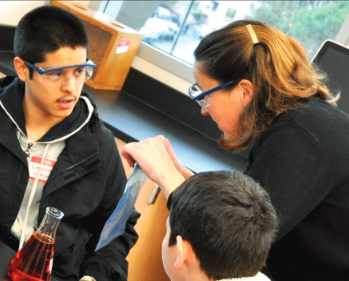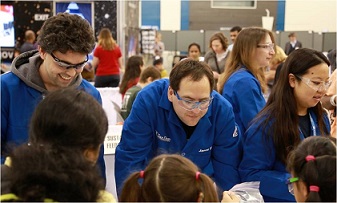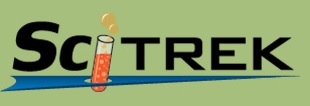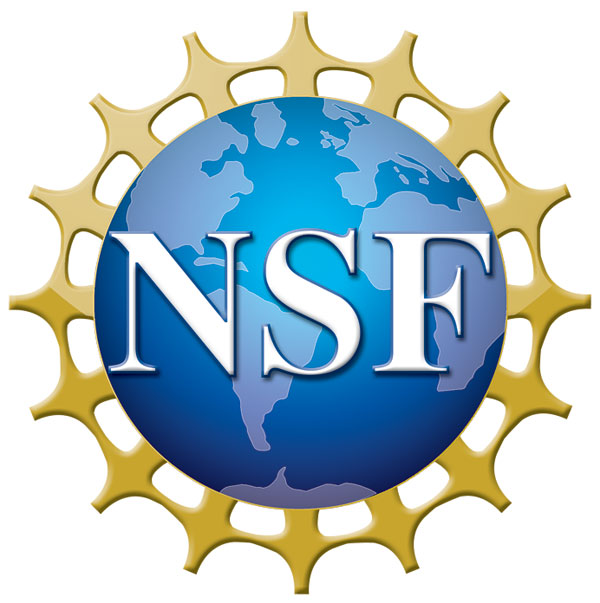CenSURF is educating graduate and undergraduate students in the principles and practices of chemical sustainability, while providing an incubator for innovation. Eduction and training also includes two formal courses developed by CenSURF investigators. We have developed educational and outreach materials that are disseminated through K-12 schools and to the general public, via participation at national scientific meetings, materials for primary and secondary school educators, and in the educational component of zoos throughout the US.
CenSURF, the South Coast Science Project and Science Matters
Summer Institute August 3-7, 2015, 8:30 AM - 3:30 PM
Teachers new to science, and those with all levels of experience, are invited to participate in this week-long workshop led by scientists and curriculum experts. Workshop Location: Carpinteria Middle School. Participants receive a $200 stipend for the one-week institute plus $50 / day for each follow-up day. Academic postgraduate credit through UCSB Extension will be available. Catered continental breakfast and full lunch provided every day.
Map for Carpinteria Middle School
SIGN-UP DEADLINE MAY 29, 2015: CenSURF, the South Coast Science Project at UCSB and Science Matters have teamed up to offer a Summer Institute, open to all teachers in grades K-6. The Institute focus is on life science content knowledge and teaching strategies; Conceptual Flow will be used to guide the week's activities. Next Generation Science Practices, practices and crosscutting concepts will be the basis of content, curriculum delivery / instruction. Best practices for ELL will be embedded throughout the workshop. Follow-up support for teachers is provided; three follow-up days to stay in touch with science experts, colleagues, and further explore activities aligned with CCSS and NGSS.
APPLICATION
COLOR FLIER
B&W FLIER
Make Connections - share with colleagues - participate in hands-on lessons, and walk away with ready-to-teach units for your students!
Institute Planning Team: Dr. Petra Van Koppen (UCSB), Dr. Darby Feldwinn (UCSB), Dr. Susan Johnson (UCSB), Kathy DiRanna (K-12 Alliance), and ten teacher leaders from Santa Barbara, Carpinteria and Ventura School Districts. Coordinator: Lilly Garcia, UCSB Director of STEM Outreach
Questions? Contact Lilly Garcia: lgarcia@education.ucsb.edu
Outreach
AAAS Family Science Days, February 14-15
Megan Chui, Bruce Johnson, and Jason Tilman lead a hands-on activity at the Amercian Association for Advancement of Sciences' "Family Science Days". This activity was designed to highlight the impact of chemical reactions involving carbon dioxide on the environment.
Summer Science Institutes
June 23 - June 27, 2014: The focus of the June Summer Institute was life and physical science for teachers in grade levels K-5. Sixty seven teachers participated, including three lead teachers.
August 4 - 8, 2014: The focus of the August summer science institute was life science for grades 3, 4, 5 and 6. Forty two teachers participated, including ten lead teachers.
Teachers new to science, and those with all levels of experience, participated in a workshop led by scientists and curriculum experts. CenSURF, the South Coast Science Project at UCSB and Science Matters teamed up to offer a Summer Institute, open to all teachers in grades 3, 4, 5 and 6.
Academic postgraduate professional growth credit through UCSB Extension was available for the teachers.
The Institute focus is on science content knowledge and teaching strategies; practice Conceptual Flow to improve results for all students. The California Science Standards, the Next Generation Science Practices, is the basis for content development; best practices for snglish language learners (ELL's) is embedded throughout the workshop. Follow-up support for teachers is provided; three follow-up days to stay in touch with science experts, colleagues, and further explore activities aligned with CCSS and NGSS
TEACHER LEADERS: Teacher leaders are participants specializing in sharing what they've learned from the science institutes with their peers, expanding the impact of the institutes far beyond the event itself. The teacher leaders are key – their energy, enthusiasm and continued contribution to our Summer Institutes have been essential to the success of the program.

At the end of the summer institute, Teacher Surveys provided lots of positive feedback, including the following “highlights” teachers indicated below.
“Experiencing the whole scientific process, especially the design and implementation of our own experiment; and the challenge to cite readings and experimental results to back up a concept/claim.”
“Meeting, networking, learning from other professionals with a high level of expertise in their fields, including other teachers!”
“The hands on, collaboration leading towards NGSS, Language Arts, Math was amazing. The constant links to experts in the field and their practices.”
“This institute has gotten me so excited for the school year to start, I can’t wait to share all of these phenomena with my students.”
“Everything has been so well-organized, well-planned, time efficient. Just please have another one!”
Institute Planning Team: Dr. Petra Van Koppen (UCSB), Dr. Darby Feldwinn (UCSB), Dr. Susan Johnson (UCSB), Paul Cordeiro (CUSD), Janet Sands (RORD Foundation), Bridget Lewin and Holly Gil (SBSD), Kathy DiRanna (K-12 Alliance), and ten teacher leaders from Santa Barbara, Carpinteria and Ventura School Districts. Coordinator: Lilly Garcia, UCSB Director of STEM Outreach
CenSURF Workshop SACNAS, April 25, 2014
April 18, 2014, a CenSURF workshop for the Society for the Advancement of Chicanos and Native Americans in Science (SACNAS) was presented by Petra van Koppen and Scott Price. This workshop featured a hands-on investigations that allowed students to explore chemical reactions and their role in our environment. Forty four high school students participated in the workshop.
CenSURF Workshop MESA DAY, March 1 2014
Approximately 500 first-generation college-bound and underrepresented minority high school students in the science, technology, engineering and math (STEM) fields attended the event presented by Petra van Koppen, Chris Bernt (CenSURF grad), and Alexandra Phillips (undergraduate). Press Release: The Mesa Day CenSURF workshop was featured on The UCSB Current “I Want To Do Chemistry”
SciTrek
SciTrek is dedicated to allowing 2nd - 5th grade students to experience the scientific process first hand. SciTrek seeks to partner with local schools to present inquiry based modules that not only emphasize the process of science but also specific grade level standards.
In collaboration with CenSURF SciTrek offers a respiration module as part of their 5th grade program. This module also introduces the concepts of a carbon cycle and the role of carbon dioxide in the environment.
5th Grade Chemistry
Supported by CenSurf, the Monroe Foundation, the Moser Trust and the Department of Chemistry and Biochemistry at UCSB
Our Fifth Grade Chemistry Outreach Program is a partnership between local elementary students and teachers and UCSB students and faculty. To improve educational opportunities for K-12 students, we have developed a program that brings fifth grade students to the chemistry lab at UCSB every Thursday morning to participate in hands-on standards-based physical science activities. The program is designed to nourish their natural curiosity in science and to stimulate an interest in pursuing a higher education in science. In addition, UCSB students are given the opportunity to share their love of science with elementary students and to consider a career path as a science educator.
http://www.chem.ucsb.edu/~
Courses
Chemistry 279: Topics in Sustainable Chemistry
Peter Ford, UCSB
Spring Quarter 2015, and 2013
This course uses the textbook "Chemistry for Sustainable Technologies, A Foundation" as a basis but the content is alsoparticipatory and student driven. Students make presentations based on topics in the text or related material. Guest speakers provide outside perspective and material to which students may not otherwise have easy access.
Chemical Engineering 579: Science Communication for STEM Professionals
Doug Bradley with Susannah Scott, UCSB
Spring Quarter 2015
Science communication focuses on enhancing the delivery, understanding, retention, and engagement of scientific information for various target audiences, particularly the general public. This course provides students within the scientific, engineering, technological and mathematical (STEM) disciplines a foundation in science communication practices that explain, persuade, describe, and entertain. Coursework focuses on composition, public speaking, graphics designs and numeric representations for creating effective written works, talks, podcasts, blogs, videos, press releases, policy briefs, posters, and reports about scientific topics. Students will learn how to craft scientific stories that are accurate, realistic and compelling.




